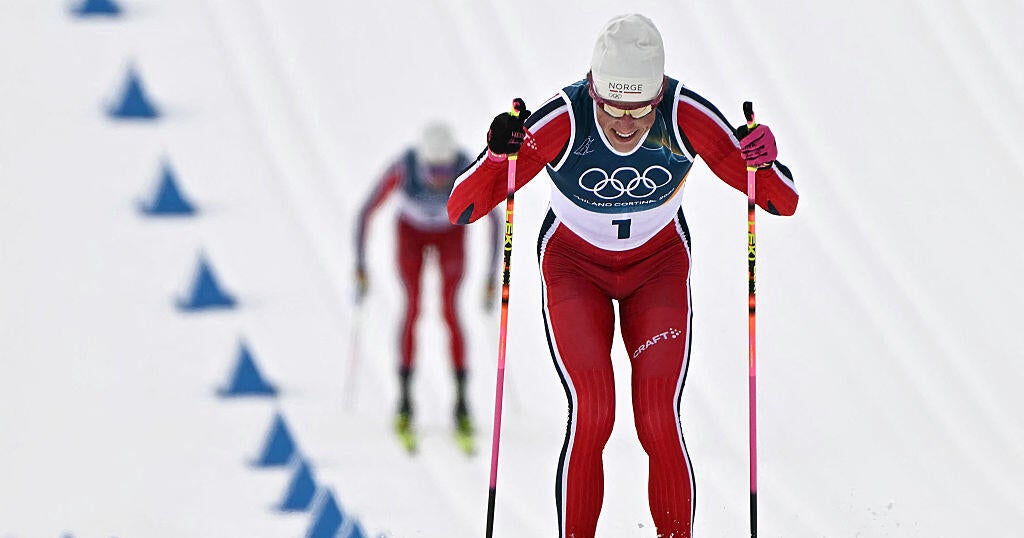Olympic champion Caster Semenya "will continue to fight" after losing appeal over testosterone restrictions
Two-time Olympic gold medalist Caster Semenya lost an appeal against regulations that limit female runners' naturally high testosterone levels earlier this week, diminishing her chances to defend her 800-meter title in the Tokyo Olympics next year. However, the South African star vowed to continue her fight in a message on social media.
"I will continue to fight for the human rights of female athletes, both on and off the track, until we can all run free the way we were born," she wrote on Twitter Thursday. In her tweet, she included a photo of herself and a Nike slogan that said: "You can't stop us."
Greg Nott, a lawyer for the South African star, told CBS News from Johannesburg, South Africa that Semenya believes she can "challenge either legally or alternatively on the racetrack." Nott said the latest legal decision is yet another setback over the course of 10 years for the 29-year-old superstar runner, who struck Olympic gold in 2012 and 2016 and won world titles in the 800-meter event.
"She feels that the system quite frankly, has been against her," he said. "So, it's disappointing."
Her most recent battle is with World Athletics, track and field's governing body. The organization formerly known as IAAF unveiled rules in 2018 barring female athletes with differences of sex development (DSD) such as Semenya from competing in races ranging from 400 meters to the mile – unless they take testosterone-suppressing drugs. The rules require female athletes to lower their testosterone level to below a certain value six months before a competition and maintain as long as they wish to compete on the women's category.
The World Athletics rules were contested in the Court of Arbitration for Sport (CAS), based in Switzerland, by Semenya and the South African Athletics Association. However, the court determined that he rules were "necessary, reasonable and proportionate" for maintaining fairness in women's track.
It is believed that Semenya, who identifies as female, has hyperandrogenism, a genetic condition that elevates levels of testosterone in her body. She took suppressants in 2012 and experienced weight gain, abdominal pain and headaches. According to Associated Press, Semenya pledged to not take them again.
The United Nations Human Rights Council has called for the regulations to be removed. The World Medical Association (WMA) has advised doctors against implementing them until there's a medical reason to do so. Dr. Frank Montgomery, chairperson of the WMA, told CBS News that there's a risk of thrombosis, a blood clot, when taking hormonal suppressant drugs.
"Hormonal interventions which are not medically indicated, which have negative health effects and which are not based on an athlete's free consent should be not only avoided, but doctors should not take part in that," he said. "We regard it as unethical to do so."
Semenya filed an appeal challenging the CAS ruling, but on Tuesday, Switzerland's supreme court dismissed her case. She criticized the decision on Twitter.
"A man can change the rules but the very same man can not rule my life," she wrote Tuesday. "What I'm saying is that I might have failed against them the truth is that I have won this battle long ago. Go back to my achievements then you will understand. Doors might be closed not locked."
The court announced the CAS ruling cannot be challenged and said it has the "right to uphold the conditions of participation issued for female athletes with the genetic variant '46 XY DSD' in order to guarantee fair competition." According to the National Institute of Health, 46 XY DSD is a condition in which an individual has one X and one Y chromosome, typically found in males, and has genitalia that is clearly not male or female.
Dorothee Schramm, a lawyer who also represented Semenya in the appeal, told CBS News that the Swiss federal court did not address key problems with the CAS decision.
"One of our key arguments in the appeal was that you cannot put sporting interests and the economic interests of one athlete above the health of another athlete," she said. "This decision is really a call to action because as a society we cannot allow the sporting federation to override the most fundamental human rights and put sporting interests above fundamental human rights."
Semenya's legal team is currently exploring options in domestic and international courts, including the European Court of Human Rights, according to Nott. He also believes race is a factor in the treatment of Semenya, who is Black.
"There are some systematic racial issues that one has to try to be on are challenged, and have challenged Caster over the period of time," Nott said. "And I think one has to recognize that there are divisions between south and north, Black and White, rich and poor. And I think that the vision of World Athletics and society at large must recognize and acknowledge that these differences are there, and they must be quashed. We see the Black Lives [Matter] movement in America that we see movement and change happening in societies and I think it's time for progressive thinking, to overtake that, which is stoic at the moment."
Despite the legal setback, Semenya remains undaunted. She is training to run in the 200-meter dash in Tokyo.




